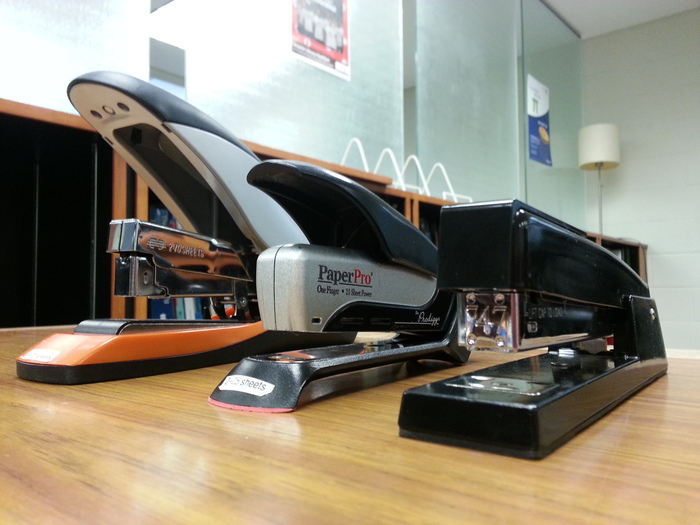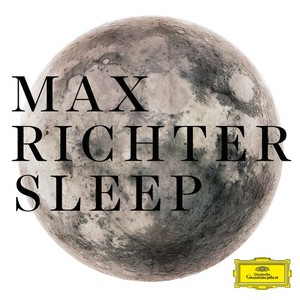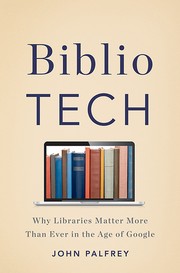The Triple Staple
On Wednesday 10 February 2016, at about 3:45 pm, at the ref desk at Steacie, I hit a new record: three consecutive questions about refilling staplers. We have three staplers here and they all emptied within minutes of each other. Three questions, three different staplers. I call this the Triple Staple.

I’ve had a few Double Staples in my time—nothing to brag about, really—but this was a personal best I will never forget.
Has anyone ever done a Quadruple Staple? Discussion among my colleagues revealed that at least one person refills the staplers at the start of his shift, and hence he has never even had a Double Staple. This was new to me: certainly no such practice was discussed at library school, but in our profession one continues to learn every year, and this is a fine example of how we share tacit knowledge. I am curious to know about your local practice.
Cato in fiction
I’m reading Dictator, by Robert Harris, the last in his wonderful trilogy about Cicero. It’s narrated by Tiro.
This scene takes place on a ship while Cicero and Cato the Younger and others are fleeing after the Battle of Pharsalus in 48 BCE, where Big Julie thrashed Pompey, which left him in sole control of Rome.
Cicero spent a long time talking alone with Cato. Later he told me that Cato was not merely calm, he was serene. “This is what a lifetime’s devotion to stoicism can do for you. As far as he’s concerned, he has followed his conscience and is at peace; he is fully resigned to death. He is as dangerous in his way as Caesar and Pompey.”
I asked him what he meant. He took his time replying.
“Do you remember what I wrote in my little work on politics? How long ago that seems! ‘Just as the purpose of a pilot is to ensure a smooth passage for his ship, and of a doctor to make his patient healthy, so the statesman’s objective must be the happiness of his country.’ Not once has either Caesar or Pompey conceived of their role in that way. For them, it is all a matter of their personal glory. And so it is with Cato. I tell you, the man is actually quite content simply to have been right, even though his is where his principles have led us—to this fragile vessel drifting alone in the moonlight along a foreign shore.”
Cicero was a remarkable man, an expert public speaker and canny politician, but he was a shifty SOB. Cato was a tough, stubborn, unremitting, relentless man who was held up by Stoics a century later as the nearest thing to a Sage, the living embodiment of Stoic perfection, since Socrates. Cato fought Caesar as long as he could, until everything was lost, and then—since to Stoics suicide is a rational action in some circumstances—he killed himself (by stabbing himself and then pulling out his own guts when the knife wasn’t enough).
I admire Cato. There’s much to be considered in what Harris has Cicero say, but of course it wasn’t Cato who got them into that situation, it was Caesar. Cato fought Julius Caesar, and fought him well, for a long time—but we all know Caesar ultimately won. Cato was difficult, and today we wouldn’t say that upholding Roman traditions like he did is always right, but he was by far the better man than Caesar.
If you’re ever in a tough situation where you’re damned sure you’re right and everyone else is wrong, then Cato is someone to remember. (As is Churchill: “Never give in, never give in, never, never, never, never—in nothing, great or small, large or petty—never give in except to convictions of honour and good sense. Never yield to force; never yield to the apparently overwhelming might of the enemy.”)
It’s very interesting to see Cato as a character in a novel. I’m slowly working my way through the Masters of Rome series by Colleen McCullough—seven books of about a thousand pages each, in their entirety covering how the Roman Republic fell, from 110 BCE and the start of Gaius Marius’s career to 27 BCE when Octavian becomes emperor Augustus. I’ve only read the first two, but in the second we meet the young Caesar and Cicero and Cato, and it’s exciting to watch how the beginnings of their lives foretell what comes later.
Soon: Addison’s Cato, A Tragedy.
STAPLR DisPerSion
Next Tuesday STAPLR + a live feed of anonymous desk activity data + Twitter streams will be the basis for a performance by the students in Doug Van Nort’s class DATT 3200, Performing Telepresence, which will take place simultaneously in the DisPerSion Lab and all the branches of York University Libraries. You can watch, listen, participate and help perform from anywhere in the world. If you’re in or near Toronto, you can experience it in person.
Tuesday 9 February 2016, 3:30 – 5:30 pm
William Denton (York University Libraries)
Doug Van Nort (School of the Arts, Media, Performance & Design)
and the
Students of DATT 3200 Performing Telepresence
Reimagine the realtime streams emanating from, to and about York University Libraries in its physical and virtual homes. Featuring:
STAPLR
William Denton’s sonification of YUL reference desks (listen remotely at staplr.org)
and
Sound, Light and Text Instruments
created by Van Nort and students, that react to YUL reference data and to Twitter feeds (@yorkulibraries, @FrostLibrary, @BronfmanLibrary, @ScottLibrary, @SteacieLibrary, @dispersion_lab).
Performed between all branches of York University Libraries (Bronfman, Frost, Maps, Scott, SMIL, Steacie) and the DisPerSion Lab by DATT students, using Twitter as their interface.
Experience the immersive version at the DisPerSion Lab (334 Centre for Fine Arts),
Watch/Listen to the virtual feed (video, audio, Twitter) at dispersionlab.org
Participate and help perform the piece by tweeting @dispersion_lab
Sleep
Saturday night I was passing by Soundscapes, the best music store I know in Toronto, so I went in to see what they had. I usually only buy CDs at gigs now, because I use a streaming music service, but I saw something that isn’t available streaming and I would like to have as a real object: the full eight-hour performance of Sleep by Max Richter.

It’s eight CDs plus a Blu-ray that has everything on one disc. I don’t actually have a CD player any more—it broke a long time ago, and then my DVD player broke a couple of years ago—so I needed to rip it (I use FLAC) to listen to it. I put in the first disc and was very surprised: the disc wasn’t part of Sleep!

Rhythmbox recognized it as Toggo Music 41, which is some kind of compilation CD by many different artists. The disc is printed as CD 1 of Sleep and has the Deutsche Grammophon label on it, however. Very strange! What’s going on in the DG factory?
I phoned Soundscapes, and they said I should bring it back for credit or exchange. They only have one copy of the box in at a time, though. I asked how long it would take to get a replacement in and the fella said he didn’t know, I’d have to bring it in.
I wanted to buy a physical copy so a local store could get some of my money, but now because of this bizarre printing error I’m going to have to make three visits there just to get the right version. I think it’s important to go to some extra effort to support local businesses, but one doesn’t expect Nature to introduce glitch like this into everyday life. However, one must accept it.
STAPLR
Announcing STAPLR: Sounds in Time Actively Performing Library Reference. It is a live streaming sonification that turns the reference desks at York University Libraries into music.
Listen in the background for ambient awareness of what’s going on at our desks—and for some beautiful moments that emerge when the simple composition currently running is applied to the unpredictable desk activity.
(I’ve had some reports from people who say it doesn’t work, but I don’t have enough details to debug the problem, so if the in-browser player doesn’t work, try the direct audio link, or try both in another browser. Requires Ogg Vorbis, so make sure your browser can handle that audio format. If the seconds are passing, it’s working, even if there’s no music: there may be nothing happening at the desks. If none of that works, please tell me your operating system and browser, and confirm you tried the direct audio link. Thanks.)
New composition coming soon, and an event in February. Technical details to follow too.
Diana Athill on reading
From Mariella Frostrup’s Open Book interview with Diana Athill:
Mariella Frostrup: What do you feel reading’s given to you over the many decades?
Diana Athill: Pretty well everything. I mean, an enormous amount of one’s experience comes from books.
Diana Athill is about to turn 98.
Westlake and Powell
“When Widmerpool appeared on his ‘run’ in the cold late afternoon mist, wearing a sweater once white and a cap at least a size too small, Jenkins was returning from the High Street.”
I just finished The Getaway Car: A Donald Westlake Nonfiction Miscellany, which is just what it says it is. Levi Stahl edited it and put together a wonderful collection.
Donald E. Westlake is one of my favourite writers, foremost of course for the Parker novels, which are stone masterpieces (except for the one even Westlake doesn’t like, where Parker actually cares about someone), but also for, to pick a few, Put a Lid On It, the Dortmunder novels (which showed me that comic crime novels don’t have to be bad), and The Ax, a better novel about business, the economy and the upper middle class than pretty much anything else out there in the last two decades, but because it’s a crime novel it got sidelined.
Westlake was a great admirer of Anthony Powell, also one of my favourite authors, whose twelve-novel sequence A Dance to the Music of Time is one of the finest works of English literature. I can’t remember when I first found this out, but it might have been when I read Plunder Squad and found this in part three (always the part in the Parker novels where you see what the other characters are doing), chapter two:
The air conditioner had been on, but Sternberg switched it off first thing, turned the thermostat up to seventy-three, and opened the window slightly. By the time he’d unpacked and desanitized everything, the air in the room had a bit of life in it. Sternberg stripped to his boxer shorts, turned down the bed, settled himself comfortably with his pillows behind his back, and opened the Anthony Powell novel he’d started on the plane. It was Magnus Donners he wanted to identify with, but he kept finding his sympathies going to Widmerpool.
If you don’t know Powell, this means nothing. If you do know Powell, first you wonder what the hell he’s doing in a Parker novel, and then you think about Donners and Widmerpool, and you think about Sternberg and what an insight that is into him. Then you think maybe it’s time you reread the Dance, and then you get back to Plunder Squad, because once you’ve started a Parker novel you can’t put it down.
Now, Levi Stahl also likes Powell. He wrote a foreword for the University of Chicago Press (where he works) edition of Venusberg. So I wasn’t surprised there was a mention of Anthony Powell in The Getaway Car. Westlake has very high praise for Rex Stout, and in a 1973 letter, he says:
Rex Stout has done something very rare in his novels. He has created an on-going mini-world, a sealed-off chamber as distinct from our world as Middle Earth. When I pick up the latest Ross Macdonald I expect his character in our California, but when I pick up the latest Rex Stout I know I will enter once more into that same alternate universe, in which Archie Goodwin will drive a Heron through the streets of some city called New York. The only other writer I know of currently working in that sort of separate continuum (not counting fantasists like Tolkien) is Anthony Powell, with his Dance to the Music of Time series; which is where that comparison ends, since Powell’s purposes and methods are very different from Stout’s.
There are a few other bits about Westlake and Powell online. Ethan Iverson (who helped Stahl with the book) says in Westlake and Powell (check the whole post for more):
Westlake told me that Anthony Powell was his favorite novelist. When I read A Dance to the Music of Time, I understood why. I’ve been through Dance twice, and will read it again.
Westlake had some strange theories about some famous books. He thought that the uninitiated should start reading Dance beginning with the fourth volume. “The first three are only really good after you read the rest.” (He had a similar idea for Nabokov’s Ada, that you should skip the first couple of chapters and only read them after you finish.) I am a completist, so I ignored his advice and began Dance with A Question of Upbringing, which I found thrilling – after the first couple of pages. Every volume of Dance starts in an abstract, highly erudite place, almost like Powell doesn’t want anybody but the committed to dig in.
I’d ignore Westlake’s advice too. Start with the first book, but don’t expect it will actually go anywhere. The second book, with the astounding 150-page description of dinner at the Walpole-Wilsons’, the Huntercombes’ ball, and the party at Milly Andriadis’s (and the temporally complex way you’re introduced to Mr. Deacon), is where I got hooked.
Terry Teachout also likes them both, as Iverson’s Interview with Terry Teachout shows:
EI: Westlake was the guy who told me to read Anthony Powell.
TT: I love that. I love the moment when we discover that one of the characters in a Parker novel is a Powell fan. And that it’s Widmerpool whom he identifies with - that’s the really funny part.
EI: There’s a surprising number of people who love Parker and Dance to the Music of Time, which seems like the least likely combination imaginable.
TT: They’re both acts of serial storytelling. The effects of the series come from our increasing intimacy with their key characters. Another part of what’s fascinating about A Dance to the Music of Time is that it resembles life in that people who you like, die. Or are transformed in such a way that you don’t like them anymore.
From a 1973 interview by Vince Cosgrove:
My admirations are not necessarily my influences. My favorite living novelist is Anthony Powell [author of the 12-volume “A Dance to the Music of Time”]. If I ever took an influence from him it would destroy me because he writes such a controlled but leisurely way that if I put anything of that into my stuff, it would break the springs. I love those books.
From a 2006 interview by Paul Kane:
PK: What writers have especially influenced you?
DW: I was about 15 when I read Hammett’s THE THIN MAN and first discovered what writing could do. He told two stories, one open and one concealed. The open story was a light romantic comedy with a slight mystery in it. The concealed story was a very sad tale of a man who has lost his role in life and has no way out. I hadn’t known you could tell the reader something without actually saying it, and I’ve loved that effect ever since. Nabokov was a master of that. But I also love good writing just for its own sake, and go back to reread Anthony Powell every once in a while. I have to be careful with him, though. After I’ve read Powell a while, my sentences get longer and longer. That works with him, but not with me.
Some of the best parts of The Getaway Car are where Westlake is analyzing other writers and why their books work or don’t. “The Hardboiled Dicks,” a talk given at the Smithsonian in 1982, is a masterful analysis of the genre, especially about Hammett (who he liked) and Chandler (who he didn’t). There’s an essay on Peter Rabe where he sets out why some of Rabe’s books are excellent and others are very poor. (He wrote Rabe for background information, and Rabe would have read the piece: Westlake is honest, and when something’s bad, he doesn’t hedge.) There’s a letter with advice to someone on the draft of a novel, and it takes a lot of experience and wisdom to clearly get to the problems like he does. Westlake has little time for Ross Macdonald, either, for example in this 1977 interview with himself and his pseudonyms:
Moderator: What about Ross Macdonald?
Donald E. Westlake: The former editor of the New York Times Book Review has admitted in print that that was the result of a conspiracy to see if he really could boost an author he liked onto the bestseller list. Since he claimed that was the only time such a conspiracy occurred, Macdonald is a fluke.
Moderator: Do you have an opinion about his work?
Donald E. Westlake: He must have terrific carbon paper.
Ouch.
I wish Westlake had written an essay about Powell and the Dance. His analysis would have been crisp, deep, fresh, respectful, irreverent, wise, warm, personal, and you couldn’t have put it down.
The thing is, Powell would never have even picked up a fucking Westlake novel. But we know that, and we accept it, because that’s who Powell was.
BiblioTech
I recommend John Palfrey’s new book BiblioTech: Why Libraries Matter More Than Ever in the Age of Google to anyone interested in that unending question of what is the future of libraries, because he sets out a future I agree with.
Palfrey was a law professor at Harvard and lately the vice-dean of library and information services at its law library, and he helped create the Digital Public Library of America and was its first board chairman. Recently he left all that to be head of posh New England private school Andover, where he gathered his thoughts and plans about libraries and set them out in this short book.
It reflects, as you’d expect, the approach of the DPLA, which is based on networked collaboration, digitization and preservation of unique resources, specialization in local material, community involvement, and open content and APIs for hackers to hack and reuse. All of this is well-argued in the book, set out clearly and logically (as law professors do), always grounded in libraries as educational institutions and librarians as educators. He knows the problems libraries (both public and academic) are having now, and sets out a way to get past them while keeping libraries both fundamental to local communities but also important at the national and international level.
I was agreeing with the book and then hit this in chapter five, “Hacking Libraries: How to Build the Future:”
The next phase of collaboration among libraries may prove to be harder. The development of digital libraries should be grounded in open platforms, with open APIs (application programming interfaces). open data, and open code at all levels. No one library will own the code, the platform, or the data that can be downloaded, “free to all.” The spirit that is needed is the hacker spirit embodied by Code4Lib, a group of volunteers associated with libraries, archives and museums who have dedicated themselves to sharing approaches, techniques and code related to the remaking of libraries for the digital era.
Damn right! The Code4Lib approach is the right approach for the future of libraries. (Well, one right approach: I agree with Palfrey’s plan, but add that on the digital side libraries need to take a leading role regarding privacy, and also need to take on climate change, with progressive approaches to labour and social issues underlying everything.)
In the next chapter he enthuses about Jessamyn West and a few others doing fresh, important, different kinds of library work. This is good to see!
Any GLAM hacker will want to read this book. I’m a bit puzzled, though: who is it aimed at? All my Code4Lib colleagues will agree with it. Non-technical librarians I know would agree with the plan, though with reservations based on worries about the future of their own areas of specialization and lack of technical skills. It will be useful when talking to library administrators. How many people outside libraries and archives will read the book? Are there more people out there interested in the future of libraries than I’d have guessed? If so, wonderful! I hope they read this and support the online, open collaboration it describes.
 Miskatonic University Press
Miskatonic University Press